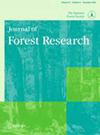小花Vitex A.Justs(Lamiaceae)叶绿体全基因组及其与Vitex种的比较
IF 1.1
4区 农林科学
Q3 FORESTRY
引用次数: 0
摘要
摘要:小花葡萄是原产于菲律宾和帝汶岛的一种极具价值的建筑木材和观赏景观物种。在这里,我们组装并表征了小花V的完整叶绿体基因组,该基因组产生了154024bp长的环状基因组,由长单拷贝(84848bp)、短单拷贝(17852bp)和两个反向重复(IR)区(25662bp)组成的四方结构表示。与其他已发表的Vitex质体序列相比,细小病毒基因组具有最少数量的注释基因,包括86个蛋白质编码、36个tRNA和8个rRNA基因。值得注意的是两个tRNA基因分别具有三个和四个拷贝。系统发育分析得到了100%bootstrap值的支持,这导致细小V.parviflora与云南V.yunnanensis(一种中国特有物种)的分组更接近,而与难以使用形态学标记进行区分的quinata更接近。IR区域的差异和假基因的存在差异很大,这表明细小V与门图中的密切相关分类群明显不同。这些发现将为其他Vitex物种的叶绿体基因组组装提供良好的基础,并有助于解决属内有问题的分类位置,以及为物种划界提供额外的证据。本文章由计算机程序翻译,如有差异,请以英文原文为准。
The complete chloroplast genome of Vitex parviflora A.Juss. (Lamiaceae) and its comparison with Vitex species
ABSTRACT Vitex parviflora A.Juss. is a highly valuable construction timber and ornamental landscape species native in the islands of the Philippines and Timor. Here, we assembled and characterized the complete chloroplast genome of V. parviflora which yielded a circularized genome 154,024 bp long, and represented by a quadripartite structure consisting of long single-copy (84,848 bp), short single-copy (17,852 bp), and two inverted repeat (IR) regions (25,662 bp). In comparison with the other published Vitex plastome sequences, the V. parviflora genome has the smallest number of annotated genes comprising 86 protein-coding, 36 tRNA, and 8 rRNA genes. Notable are the two tRNA genes having three and four copies, respectively. Phylogenetic analysis is supported with 100% bootstrap value which resulted to V. parviflora grouping closer with V. yunnanensis, a species endemic to China, than with V. quinata which it is difficult to discriminate from using morphological markers. Differences in IR regions and the presence of pseudogenes varied considerably, suggesting that V. parviflora is clearly different from the closely related taxa from the phylogram. These findings will provide a good basis for chloroplast genome assembly of other Vitex species and be useful for resolving problematic taxonomic positions within the genera, as well as provide additional evidence for species delimitation.
求助全文
通过发布文献求助,成功后即可免费获取论文全文。
去求助
来源期刊

Journal of Forest Research
农林科学-林学
CiteScore
3.00
自引率
6.70%
发文量
62
审稿时长
3 months
期刊介绍:
Journal of Forest Research publishes original articles, reviews, and short communications. It covers all aspects of forest research, both basic and applied, with the aim of encouraging international communication between scientists in different fields who share a common interest in forest science.
 求助内容:
求助内容: 应助结果提醒方式:
应助结果提醒方式:


